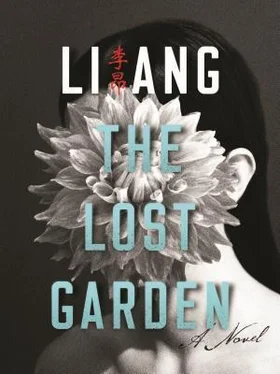The voice-over narration was by a female newscaster in a clearly enunciated, professional, and yet emotionless voice:
Ms. Zhu Yinghong, descendant of Taiwan’s famed gentry family from Lucheng, followed an original design in completing the renovation of Lotus Garden, built by her ancestors two hundred years ago. It was once a private residence, but Ms. Zhu recently established the Lotus Garden Foundation and opened the garden to the public. Now more people will have a chance to visit one of Taiwan’s rare natural beauties. A ceremony held earlier today was attended by both government officials and members of Lucheng’s gentry.
The camera shifted and the buildings disappeared, replaced by a shot of a crowd, before moving to a medium shot of a woman. For a moment, the thirty-six screens were filled with the face of a woman in her late thirties.
On that face was a pair of large, beautiful eyes, more sunken than those on most Asian faces, giving the face a clearly defined outline, though the nose bridge was not particularly high. Her thick lower lip contrasted with a much thinner upper lip, lending an unquestioned sensuality to her face. For some reason, she looked anxious, perhaps because the slightly gaunt face displayed an agitation more commonly seen on older women. She was wearing a simply cut, lacy white dress with a V-neck; the sleeves, made of tightly woven, soft lace, barely covered her shoulders. A long white scarf of the same material was wrapped over her head; curls of black hair peeked out from one end of a scarf that dangled across her chest. Strands of hair quivered under an early summer morning breeze, as dazzling sunlight shone down on her scarf and dress from treetops; the V-neck opening was highlighted by a diamond clearly weighing more than ten carats.
The professional voice-over now turned affectionate, with a hint of a smile: “Zhu Yinghong was able to renovate Lotus Garden with the help of her husband, Lin Xigeng, a real estate tycoon. It is rumored that he promised the renovation as a wedding gift to his beloved wife.”
The camera moved from a sweep of the government officials and local gentry to a close-up of a man in his forties. The face, which must have been very handsome in the man’s younger days, had filled out, but that added a measure of self-assurance and confidence that bordered on haughtiness. His tightly pressed lips were thin but nicely outlined; the glasses resting on his high nose lessened the severe look and added a genteel air. With sunlight reflecting off the lenses, it was hard to see the expression in his eyes, only that they seemed dark and harsh. A unique sense of confidence betrayed an untamed expansiveness, particularly when he turned his head to look around, chin held high.
The voice-over resumed its flat narration:
Lotus Garden, built prior to 1850, is more than ten acres in size, and, owing to the hills around it, has the feel of a mountain forest. Some of the terraces, pavilions, and vegetation are arranged in clusters, others set off by themselves. Undulating structures of varying heights are a sheer delight. Lotus Garden is centered on a large pond filled with lotus flowers and flanked by rocky heights from which a waterfall cascades. Surrounded by a number of paths, winding verandas, high towers, and terraces, the garden is a perfect place for a visitor to lose himself as he becomes one with nature, his mind soaring freely.
The camera paused on an octagonal doorway, where an unusual rock formation and a stand of short bamboo were framed by a red-brick door through which the camera entered, taking the viewer to a long meandering loggia that seemed to twist and turn without end. Before long the camera panned over the lotus flowers and tilted upward to display a tower. A quick turn around the tower led the viewer to a terrace, a pavilion, and the waterfall.
As the camera moved faster and faster, it traveled through dense trees and flowers, past swallow eaves and green-glazed tiles, over red bricks and white walls, all repeated on each of the thirty-six screens. The group had been focusing on one screen, but it was hard not to look at the entire wall of screens for fear of missing something. As the viewers’ gazes shifted, the thirty-six screens seemed to move, creating a surreal tapestry, so they all quickly looked back to the first screen, but by then everything had changed; it was hard to shake a feeling that they had missed something when their eyes moved from screen to screen. The endlessly shifting gazes increased the illusion that everything was undergoing continuous change.
“Wow! It’s like a labyrinth,” Shen said as he rubbed his eyes.
“Hurry. We have more bars to visit.”
At that urging, the short young man with the cardboard sign turned around; framed by garden scenery on thirty-six TV screens, the blood-red writing on the sign looked shockingly gaudy. The red paint looked like intertitles on the TV screens:
Help Charlie
And the Chinese text beneath it:
Cha-li bing le.

It was nearly midnight, but the summer night was still plagued by the high temperature and humid air that wrapped itself around the thoroughfare, with its endless flow of traffic, car horns, and engine noise. Neon lights along the street turned into a river of colored light shining down on sidewalk stalls suffused with the din of clamoring people. On this bustling, noisy, chaotic, and yet colorful street in the city of Taipei, the large wall of TV screens continued to display a breeze blowing over flowing water and swaying willows. Terraces, towers, and pavilions, with their soaring eaves and green tiles, seemed to replicate themselves as they turned into a fantastic illusion of an endless sequence of images.
ONE. “I WAS BORN IN THE LAST YEAR OF THE FIRST SINO-JAPANESE WAR …”
Zhu Yinghong’s teacher had chosen the word “I” as the theme for the first assignment in her third-grade writing class. Nine-year-old Yinghong picked up her pencil, sharpened to a fine point, and wrote the opening sentence in her notebook without hesitation: I was born in the last year of the First Sino-Japanese War.
What next? She wrote something on her cheap notebook, erased it, wrote something else, and erased that, until the thin paper was creased and torn by her pencil point and eraser, and the board she was writing on had slipped off her desk more than once, and still no second sentence. Finally, she picked up her copy of Sample Essays , turned to the “I” section, and finished her first essay in accordance with the sample given in the book. Naturally, that included all the third-grade practice sentences like “I have a Papa and a Mama. We are a very happy family. I also have two elder brothers. We live in the middle of a large garden.” When she couldn’t write a Chinese character, she used the standard phonetic system.
Her teacher, known by her Japanese name, Keiko, was a small woman with stumpy calves that, visible beneath her skirt, were devoid even of the normal curve of ankles. Yinghong had heard from someone, probably the maid Mudan, who had come along with Mother when she was married, that those were called “turnip legs,” the shape a result of all that kneeling on tatami mats. Only a few years had passed since the Japanese had been repatriated, and the adults were now saying that “turnip legs” were ugly.
Her mother often sat on her legs too, but they didn’t look like turnip legs to her. And every time her mother tried to get her to sit that way, she refused unrelentingly, harboring a secret dread; not only did adults call those turnip legs ugly, but the very thought of them terrified her somehow. There was a time that whenever the maid muttered “You don’t look right whether you’re sitting or standing,” Yinghong petulantly refused to do what she was told, and all Mudan had to say was “You’ll wind up with turnip legs” for her to turn obedient.
Читать дальше













